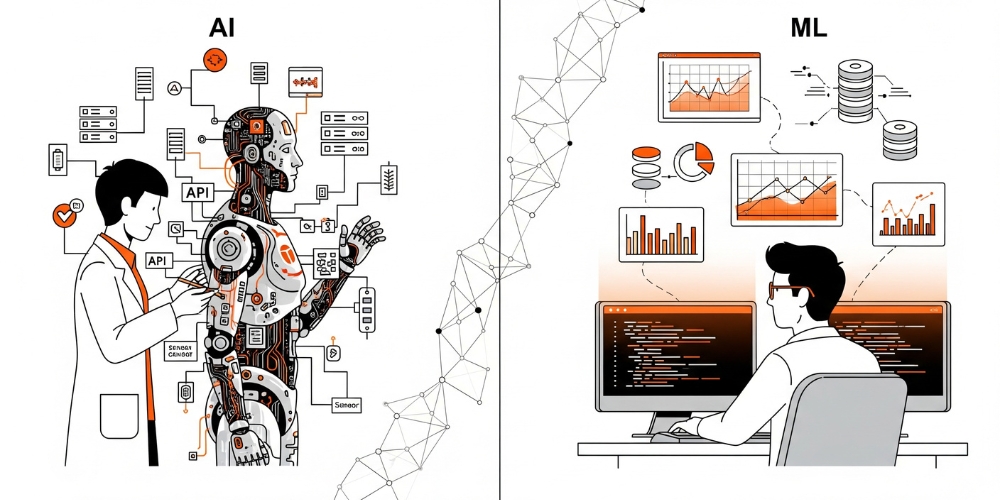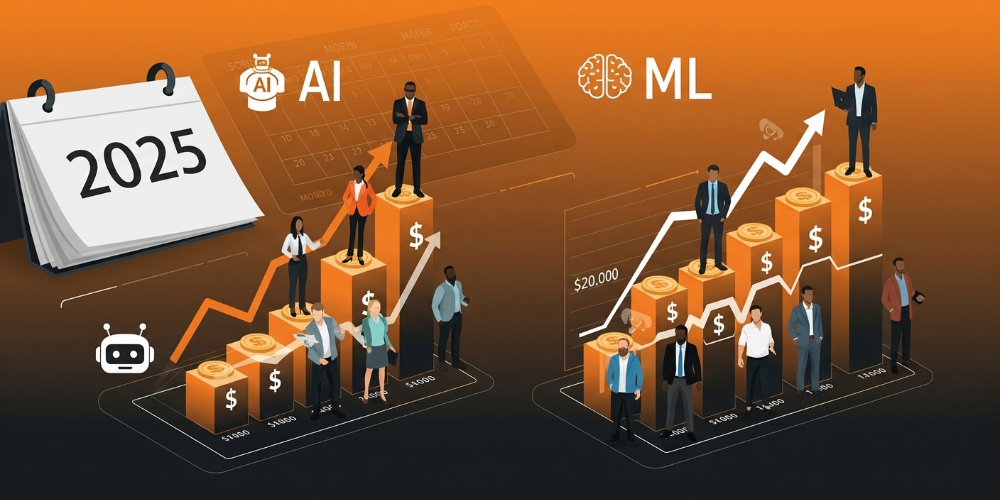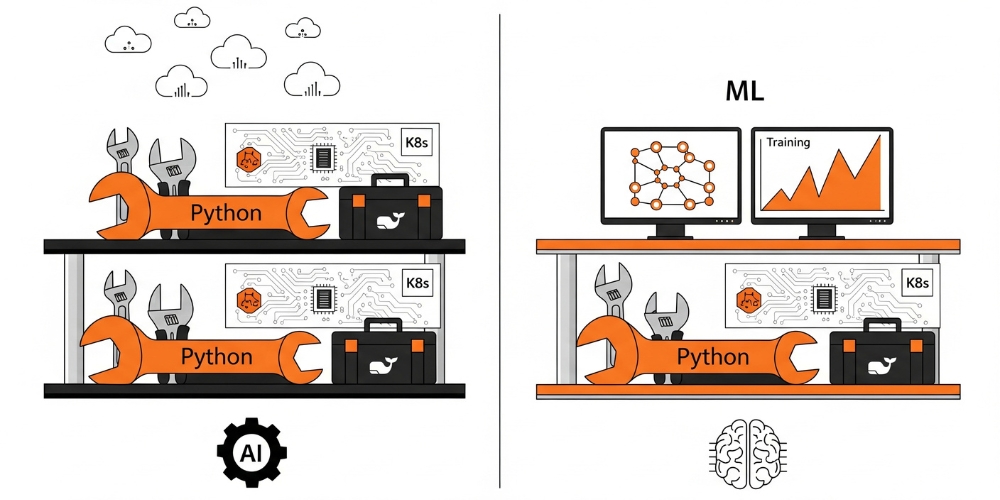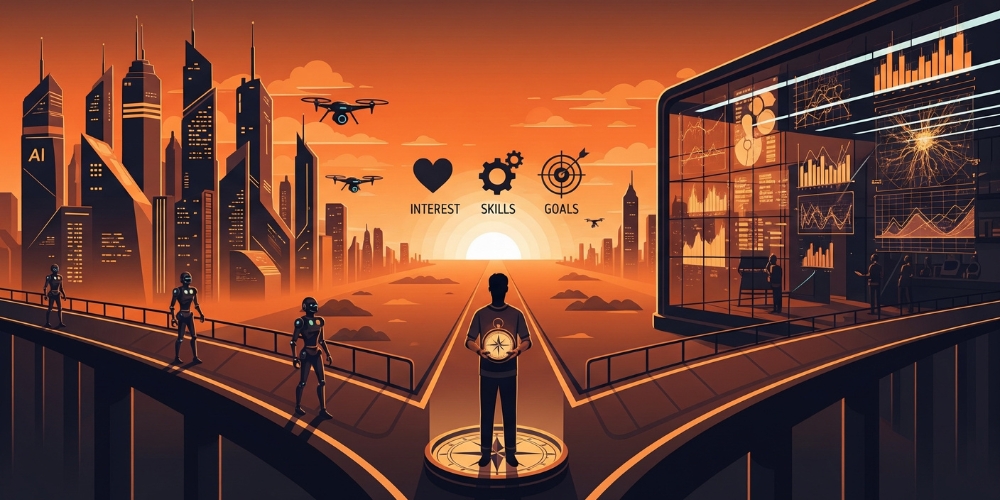
TL;DR
- AI engineers build intelligent systems; ML engineers build learning algorithms.
- AI engineer vs ML engineer salary: AI engineers earn slightly more in 2025.
- ML vs AI engineer: ML roles are model-focused; AI roles are system-focused.
- Both are in high demand across tech, finance, and healthcare.
- Choosing between AI engineer, or ML engineer depends on your strengths.
- Hybrid roles like data science AI engineer are rising fast in startups and enterprises.
The terms AI engineer vs ML engineer are often used interchangeably, but if you’re planning a career in this space or hiring someone who is, you’ll need to know the difference. The rise of generative AI, LLMs, and intelligent automation has accelerated job openings across both roles, but there’s growing confusion about which does what, and which one pays more.
Here’s the good news: the AI/ML space is booming in 2025, and you don’t have to guess your way through it. This blog will break down the real-world differences between ML vs AI engineer, current salary trends, essential skills, and how to pick the best career path based on what you’re good at and what you enjoy.
What’s the Difference Between an AI Engineer and ML Engineer?

Understanding AI Engineer vs ML Engineer Roles
At a glance, both roles work in the artificial intelligence ecosystem, but they focus on very different layers of that system.
| Role | Primary Focus | Typical Deliverables |
| AI Engineer | Builds full intelligent systems | Chatbots, recommendation engines, robotics |
| ML Engineer | Develops machine learning models | Classification models, regression models, ML pipelines |
So, What Does Each Role Actually Do?
- A machine learning engineer focuses heavily on designing, building, and scaling ML models. They spend much of their time with algorithms, data pipelines, feature engineering, and model optimization.
- An AI engineer, on the other hand, may use those ML models but also work on integrating them into larger systems like voice assistants, smart devices, or customer support bots. This role might also deal with natural language processing (NLP), computer vision, or decision systems.
If you’re comparing ML engineer vs AI engineer, think of it like this:
- ML engineers are like chefs perfecting recipes (models)
- AI engineers are like restaurant managers building the entire experience using those recipes
Core Responsibilities Compared
| Task | AI Engineer | ML Engineer |
| Model Selection | ✅ | ✅ |
| Data Preprocessing | ✅ | ✅ |
| Model Training & Tuning | ✅ | ✅ (Primary) |
| Production Deployment | ✅ (Primary) | ✅ |
| System Integration | ✅ (Primary) | ❌ |
| Use of Reinforcement Learning | ✅ | Limited |
| Interaction with IoT or Robotics | ✅ | Rare |
Do Companies Treat These as Separate Roles?
Yes, and increasingly so. While some startups hire under a combined “AI/ML engineer job description”, enterprise companies like Meta, NVIDIA, and OpenAI now publish separate job postings.
For instance:
- AI Specialist vs AI Engineer: Some companies now use “AI Specialist” to refer to domain-specific experts (like those in NLP or ethics), while “AI Engineer” implies a broader implementation role.
- Data science AI engineer is another hybrid title that combines AI engineering skills with statistical analysis and experimentation.
Match the Tasks to the Right Role
AI Engineer
ML Engineer
Salary Comparison: AI Engineer vs ML Engineer (2025)

Here’s a detailed breakdown of AI and ML engineer salaries in the U.S. for 2025:
When comparing AI engineer vs ML engineer salary in 2025, the data is clear: both are well paid, but AI engineers get paid more, especially in senior positions or top tech companies.
AI Engineer Salaries (2025)
- According to Glassdoor data in mid‑2025, the average AI engineer salary in the U.S. stands at approximately $136,000 per year, with typical ranges between $108K (25th percentile) and $174K (75th percentile). Top earners can reach $215K+.
- Built In reports that entry-level AI engineers may start around $80K, while experienced engineers (7+ years) average about $186K.
- Compensation at top tech companies shows massive upside: Levels.fyi data reveals staff-level AI engineers at firms like Intuit earning total packages close to $917K, versus $515K for non-AI staff engineers, highlighting the AI premium.
- Business Insider notes elite AI startups (OpenAI, Anthropic) offer base salaries up to $530K–$690K for research and engineering roles. Companies like Microsoft and Google are offering up to $340K even for non-startup roles.
ML Engineer Salaries (2025)
- Built In puts the average base salary for a Machine Learning Engineer at $158,147, with additional cash compensation averaging $44K, totaling around $202K.
- Glassdoor-based estimates show mean ML engineer salaries trending at $155K, with experience-level breakdowns:
- 0–1 yr: $118K
- 2–3 yrs: $134K
- 4–6 yrs: $156K
- 7–9 yrs: $169K
- 10+ yrs: $191K+
- 0–1 yr: $118K
- DataCamp cites average ML engineer base pay at around $162,500 in 2025.
- Mason Alexander’s 2025 guide reports entry-level ML engineer salaries between $105K–$150K, mid-level $150K–$200K, and senior roles exceeding $200K–$350K+.
AI Engineer vs ML Engineer: Side‑by‑Side
| Role | Avg Base Salary (U.S.) | Typical Total Comp. | Top-End Packages |
| AI Engineer | ~$135K–$160K | $160K–$200K+ | $300K–$900K+ in FAANG/startups |
| ML Engineer | ~$155K–$160K | ~$200K (incl. bonuses) | $200K–$250K+ at big firms |
The bottom line: if you’re comparing AI engineer or ML engineer, AI roles slightly edge out on average, especially at senior levels or when equity/bonus potential is considered. That said, strong ML engineer vs AI engineer compensation overlaps exist, emphasis varies by company, and specialization. Companies are willing to pay top dollar for specialized roles, but they also want to reduce hiring risk. That’s why many now leverage talent assessment tools to screen for AI and ML-specific skills before making an offer.
Action Tip: To negotiate well, highlight niche skills like large-scale MLOps, LLM deployment, or vector databases. These can propel you into the upper compensation tiers.
Required Skills and Tech Stack for Each Role

Skills & Tech for an AI Engineer
From our research, the role labeled “AI engineer vs machine learning engineer” regularly demands a broader toolset:
Core Technical Skills:
- Programming: Python is universal; Java also ranks high (Java ~22% of postings vs ~13% for data scientists).
- Cloud Platforms: Azure (~33% of roles) and AWS (~26%) dominate deployment requirements.
- Containerization & MLOps: Tools such as Kubernetes (17.6%), Docker (15.4%), CI/CD (10.4%) are essential.
- Data Engineering Focus: Proficiency with data pipelines (11.6%), Big Data frameworks like Spark (~10.5%), Kafka (~4.8%), Airflow (~3.4%), and vector DBs (~4.5%) is increasingly common.
Specialized AI Skills:
- NLP, computer vision, reinforcement learning and even robotics integration can fall under the AI engineer remit, especially in large scale system design and model orchestration.
Interdisciplinary Skills:
- Ability to manage full stack systems, including ETL pipelines, user interfaces and model monitoring. The typical AI specialist vs AI engineer distinction often sees specialists deep in NLP or ethics, but engineers need broader systems understanding.
Recommended Tech Stack:
- Python, Java, AWS/Azure, Kubernetes, Docker, Spark, Kafka, Airflow, vector databases. Familiarity with SageMaker, Azure ML, or GCP’s AI Platform is a plus.
Skills for a ML Engineer
The ML engineer vs AI engineer role is more specialized, focused on algorithmic excellence and model deployment pipelines.
Core Technical Skills:
- Model Building: Model training, tuning, and hyperparameter optimization with TensorFlow, PyTorch, and scikit-learn.
- Data pipelines & feature engineering: Preprocessing and dataset structuring are essential.
- MLOps Basics: Deployment tools like Docker, Kubernetes, and CI/CD pipelines are often expected.
Cloud/Data:
- Use of cloud ML tools (SageMaker, Vertex AI, Azure ML), knowledge of SQL/noSQL databases, and data engineering basics.
Recommended Tech Stack:
- Python, SQL, scikit-learn, PyTorch/TensorFlow, Airflow, Docker/K8s, AWS/MLOps stack, and sometimes Spark for big data projects.
In many postings labelled “data science AI engineer job description”, you’ll see a blend: heavy statistical analysis (data science), plus ML modeling, sometimes with system integration responsibilities.
Summary: Skill Comparison
| Competency Area | AI Engineer | ML Engineer |
| Programming | Python + Java | Python |
| Cloud Deployment | AWS, Azure (MLOps tools) | AWS/GCP/Azure basic usage |
| Containerization | Kubernetes, Docker, CI/CD | Docker, basic Kubernetes |
| Data Processing | Kubernetes, Spark, Kafka, vector DBs | ETL, feature engineering with Spark or SQL |
| Model Expertise | General ML + NLP/CV/RL integration | Specialized model tuning, pipelines |
| System Integration | Full-system design & deployment | Model-to-production pipelines |
Which Career Path Is Better for You?

Choosing between AI engineer vs ML engineer ultimately comes down to your strengths, interests, and long term goals:
Choose ML Engineer if you:
- Prefer working deeply with algorithms, model building, hyperparameter tuning, and statistical optimization.
- Enjoy focused roles in data science AI engineer, or algorithmic pipelines rather than full system integration.
- Value roles where expertise in frameworks like PyTorch, TensorFlow, and scikit-learn matters most.
- Want a structured path where your contributions are clear: model performance and predictive accuracy.
- Like collaborating closely with data scientists to refine models and then operationalize them via MLOps.
If you’re leaning toward ML, especially in high-demand sectors, check out our full guide on machine learning recruitment.
Choose AI Engineer if you:
- Enjoy designing and deploying complete intelligent systems, not just models.
- Want to build end-to-end products involving NLP, robotics, computer vision, or decision-making systems.
- Prefer to work across cloud, DevOps, containerization, data engineering, and application integration.
- You see yourself as an AI specialist vs AI engineer, someone who combines algorithmic skill with architectural vision.
- You are inspired by solving real world user problems using connected systems, not just accuracy metrics.
Key Considerations:
Demand & Career Trajectory
- AI engineer roles are skyrocketing, with about 1 in 4 tech job listings in the U.S. requiring AI or ML skills.
- AI roles are often among the fastest-growing and highest-compensated (especially in elite tech and hedge fund firms).
- ML engineering continues to grow strongly, especially within data-driven industries like finance, healthcare, and product analytics.
Growth Potential & Skills Synergy
- Machine learning skills are increasingly complemented by system-level engineering expertise. According to research on skill complementarity, possessing both technical and soft skills enhances wage premiums by ~21%.
- Employers are shifting toward skill-based hiring: mastery of ML frameworks or building AI systems now outweighs formal degrees in many listings, especially for ML roles.
Lifestyle & Soft Skills
- AI engineer roles often require cross functional collaboration, communication with business stakeholders and high emotional intelligence, which recruiters highlight alongside technical acumen.
- ML roles may be more technical and siloed initially, but still require project experience and product-oriented thinking, especially in ML vs AI engineer blended jobs.
Action Steps:
- If you’re early in your journey, build tangible portfolio projects: pick a model-building project for ML or integrate multiple components (model + UI or API) for AI.
- Explore internships or open-source work in areas like vector databases, LLM integration, and model inference pipelines. These bridge ML to AI systems.
- Choose credentials and training that reflect hands-on skills: skills-based hiring trends favor demonstrated ability over degrees, except at research-intensive roles or hedge funds.
Conclusion
Whether you choose to be an AI engineer or ML engineer, both paths are awesome in 2025. ML engineering is for you if you love modeling, analytics, and algorithmic depth. But if you love building systems that impact users and you’re excited by system design, integration, and deployment, AI engineering offers more scope and higher pay. Pick the path that suits you, build real world experience, and be adaptable. You’ll be set for a great future in AI.




